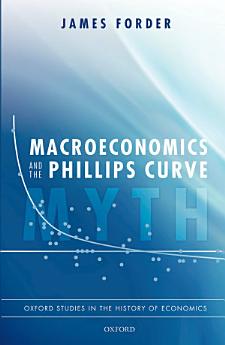Macroeconomics and the Phillips Curve Myth
Okt 2014 · OUP Oxford
E-Book
320
Seiten
family_home
Zulässig
info
reportBewertungen und Rezensionen werden nicht geprüft Weitere Informationen
Über dieses E-Book
This book reconsiders the role of the Phillips curve in macroeconomic analysis in the first twenty years following the famous work by A. W. H. Phillips, after whom it is named. It argues that the story conventionally told is entirely misleading. In that story, Phillips made a great breakthrough but his work led to a view that inflationary policy could be used systematically to maintain low unemployment, and that it was only after the work of Milton Friedman and Edmund Phelps about a decade after Phillips' that this view was rejected. On the contrary, a detailed analysis of the literature of the times shows that the idea of a negative relation between wage change and unemployment - supposedly Phillips' discovery - was commonplace in the 1950s, as were the arguments attributed to Friedman and Phelps by the conventional story. And, perhaps most importantly, there is scarcely any sign of the idea of the inflation-unemployment tradeoff promoting inflationary policy, either in the theoretical literature or in actual policymaking. The book demonstrates and identifies a number of main strands of the actual thinking of the 1950s, 1960s, and 1970s on the question of the determination of inflation and its relation to other variables. The result is not only a rejection of the Phillips curve story as it has been told, and a reassessment of the understanding of the economists of those years of macroeconomics, but also the construction of an alternative, and historically more authentic account, of the economic theory of those times. A notable outcome is that the economic theory of the time was not nearly so naïve as it has been portrayed.
Autoren-Profil
James Forder has been a senior teaching member of Oxford University since 1993 and is Andrew Graham Fellow and Tutor in Political Economy at Balliol College Oxford, where he is also Vice Master (Executive). He has taught at La Sorbonne and for Stanford University, and is Managing Editor of Oxford Economic Papers. He has previously researched on European integration and the economics of central bank independence. He was Senior Tutor of the Oxford University Business Economic Programme, and a member of the Council of Business for Sterling, in the days of the debate over British membership of the euro.
Dieses E-Book bewerten
Deine Meinung ist gefragt!
Informationen zum Lesen
Smartphones und Tablets
Nachdem du die Google Play Bücher App für Android und iPad/iPhone installiert hast, wird diese automatisch mit deinem Konto synchronisiert, sodass du auch unterwegs online und offline lesen kannst.
Laptops und Computer
Im Webbrowser auf deinem Computer kannst du dir Hörbucher anhören, die du bei Google Play gekauft hast.
E-Reader und andere Geräte
Wenn du Bücher auf E-Ink-Geräten lesen möchtest, beispielsweise auf einem Kobo eReader, lade eine Datei herunter und übertrage sie auf dein Gerät. Eine ausführliche Anleitung zum Übertragen der Dateien auf unterstützte E-Reader findest du in der Hilfe.





